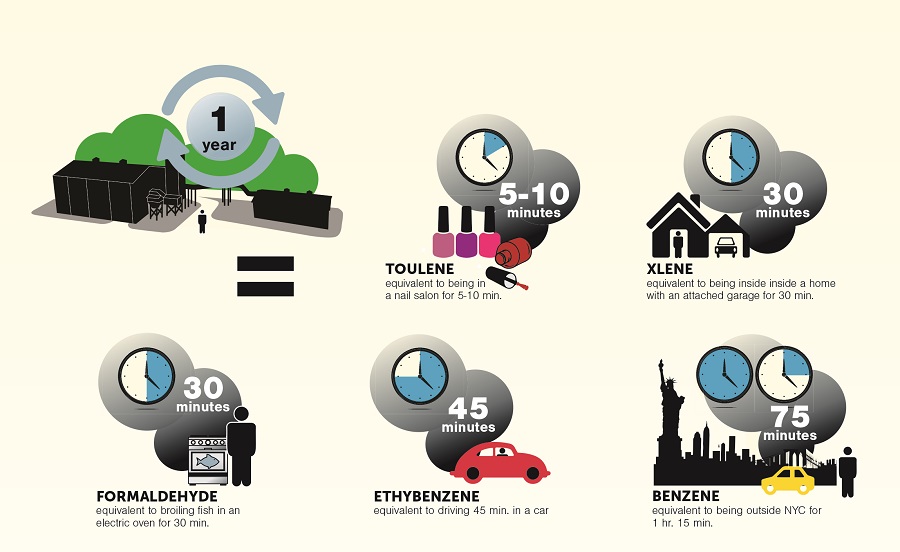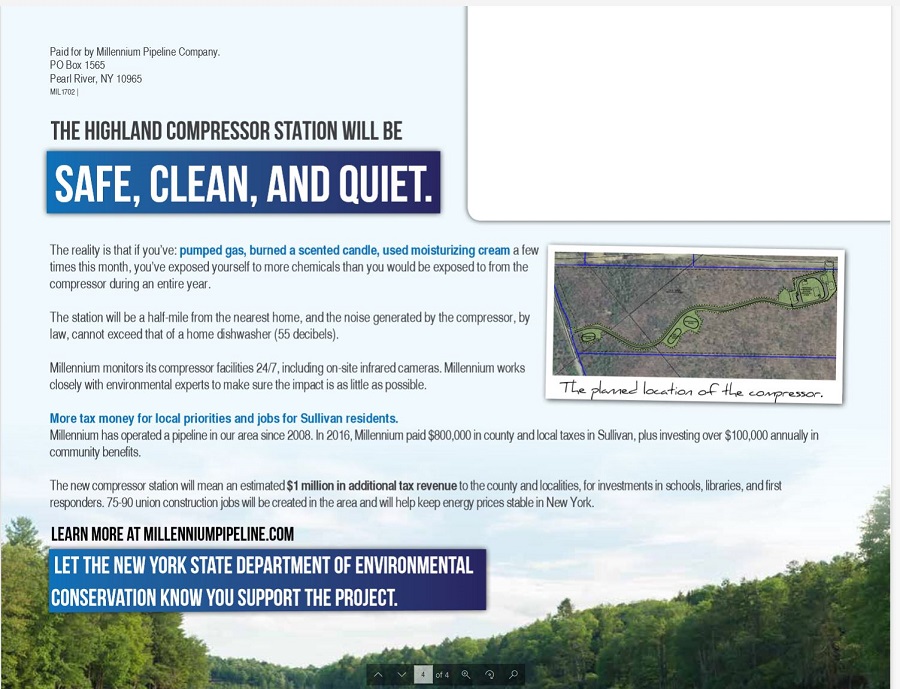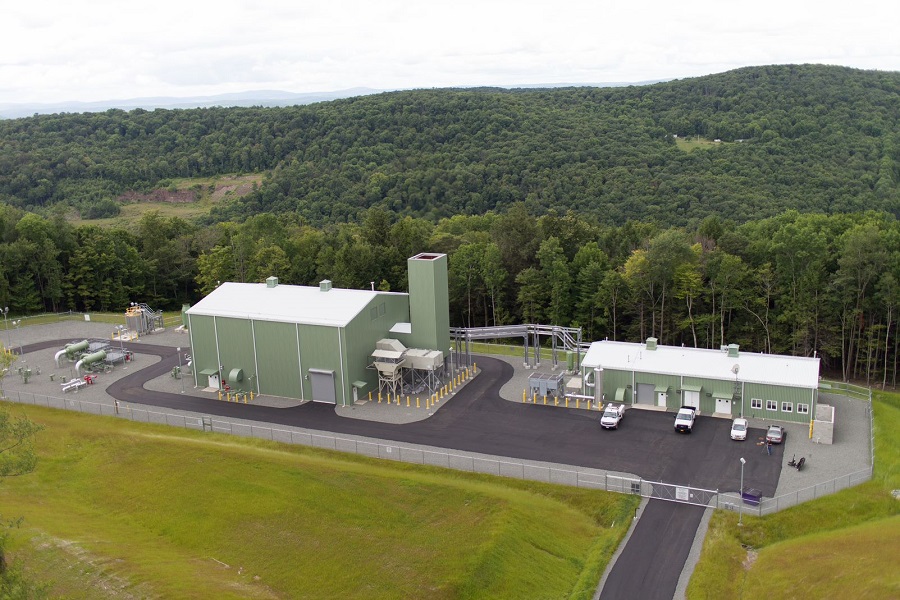December 2017, Vol. 244, No. 12
Features
Millennium Pipeline Defends Compressor Emissions with ‘Real-World’ Comparisons
By Jeff Awalt, Executive Editor
The dramatic rise in anti-pipeline activism has been a game-changer for an industry accustomed to public decorum, but pipeline companies are learning to play by the new rules. Millennium Pipeline Company is a notable example.
Millennium recognized that activists use legitimate facts out of context to mislead and frighten the public, and the instant spread of misinformation through social media leaves little time to respond effectively. Facing opposition to an important system expansion in two New York state counties, Millennium used scientific research to arm itself with an arsenal of facts, then made a preemptive strike with a public awareness campaign that challenged conventional wisdom about compressor emissions.
“You have to be ready with the facts if you’re going to push back or offer some kind of context when people make claims about your project,” said Millennium President Joseph Shields. “Our goal in this particular case was to arm ourselves with proven facts that clearly show how information is being blown way out of proportion.”
In one example, an opponent tweeted at Millennium’s PR director, Michelle Hook, that one of Millennium’s compressor stations would release 100 tons of emissions every year without providing any context for the number.
“Most people don’t know what this means, so they see 100 tons and freak out. But a lot of that is C0-2, which we all breath out every day – it’s not toxic. And, in addition to that, if you drive an SUV, you’re putting out about 50 tons a year,” Hook said. “That’s one person driving one car, not a facility serving hundreds of thousands of people who receive this energy to heat and cool their homes and supply electricity.”
As part of its Eastern System Upgrade project, Millennium Pipeline is seeking to construct and operate a new compressor station in Sullivan County, NY, and add compression to an existing compressor station in adjacent Delaware County. In support of the project, Millennium commissioned a study that puts compressor-related emissions in perspective by comparing them with common emissions that most people encounter regularly through their daily activities.
The company engaged the environmental and risk sciences consulting firm Gradient Corp. to conduct the study. Using what it described as a “very conservative” model that overstated likely exposure from the compressor stations, Gradient modeled potential exposure to five volatile organic compounds (VOC) – benzene, ethylbenzene, formaldehyde, toluene, and xylene – and compared them with VOC exposures from common activities.
Even using the worst-case conditions from the compressor stations, which assumed the exposed person was outdoors at the most impacted location 24 hours a day for a year, Gradient said the comparisons illustrate that “exposures to the five VOCs will continue to be dominated by the everyday contributions from a variety of common sources and personal activities, rather than by emissions from the compressor stations.”
For example, the model showed that breathing air by Millennium’s proposed Highland compressor station in Sullivan County for a year would result in the same level of benzene exposure as driving a car for about five minutes. Other real-world examples from the study included:
- Ethylbenzene exposure from the Highland station is the same as spending about an hour and a half in a house with a doorway to an attached garage.
- Formaldehyde exposure from the Hancock station is the same as being outdoors in New York City for about 44 hours and 50 minutes.
- Toluene exposure from the compressor units is the same as spending 5-10 minutes inside a nail salon.
- Xylene exposure from Hancock is the same as being outdoors for about 50 minutes at a gas station.
Millennium used the comparative results from its study in an informational campaign about the project, including direct mail and radio ads. The campaign wasn’t aimed at the extreme opposition, but the reasonable and undecided middle – those people who have an open mind and, therefore, might be swayed by misinformation from project opponents.
“This week, you will likely do at least one of these things: Drive a car, pump gas, apply skin moisturizer, burn a scented candle,” one Millennium’s radio spots began. “Now we all know that none of these is a major health risk. But did you know that if you stood at the fence line of Millennium’s proposed transmission compressor in Highland for an entire year, the health risk is even smaller?”
The campaign appears to be an industry first, but it’s not the only way Millennium has broken new ground. When Sullivan County officials requested that the company conduct a study to ensure that its new compressor station didn’t pose any health risks, Millennium went a step farther. It took the unprecedented step of inviting the county to hire a third-party consulting firm of its choosing and conduct its own study at Millennium’s expense.
The only requirement was to hire a firm that did not have a strong, anti-pipeline agenda. “Short of that, if it was a reputable, credible research firm, then we give them the money and say, ‘Here, go study us – don’t tell us when or where,’” Shields said, acknowledging there was some initial pushback against the idea inside the company.
“Whenever you do something different, people’s first reaction is going to be, ‘Why are you doing that? But we needed to do a study, so it really was just a matter of giving Sullivan County full independence and autonomy to do it on their own,” Shields explained. “These are state-of-the art compressors, and I’m confident the studies will turn out the way we expect them to. So we discussed it, and I said, ‘I’ll listen to any argument, but why shouldn’t we do it?’ And everyone agreed it’s a good thing to do.”
Since the Gradient study produced all those real-world comparisons, the projected emissions for both of the compressor stations were revised down with the addition of booster pumps to their designs at a cost of about $1 million apiece. Millennium agreed to add a booster pump at one of the stations in response to community requests, then decided voluntarily to install the same emissions-capturing technology at the other facility, as well.
Millennium believes the environment for pipeline companies has changed for the long term, and the industry has to adapt.
“We’ve got to be more proactive. We’ve got to work with the community. And we want to be a green company, so we’re doing everything we can to keep our customers and employees healthy,” Shields said. “I think pipeline companies might protect themselves by proactively doing some things now that they’ll eventually be required to do – especially up in here in this very environmentally conscious region where we operate.”









Comments